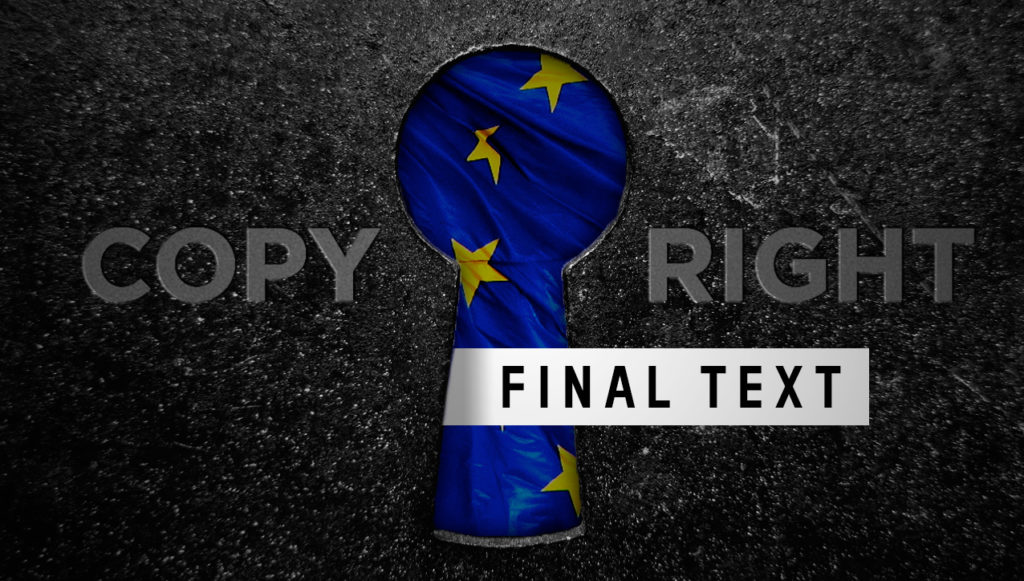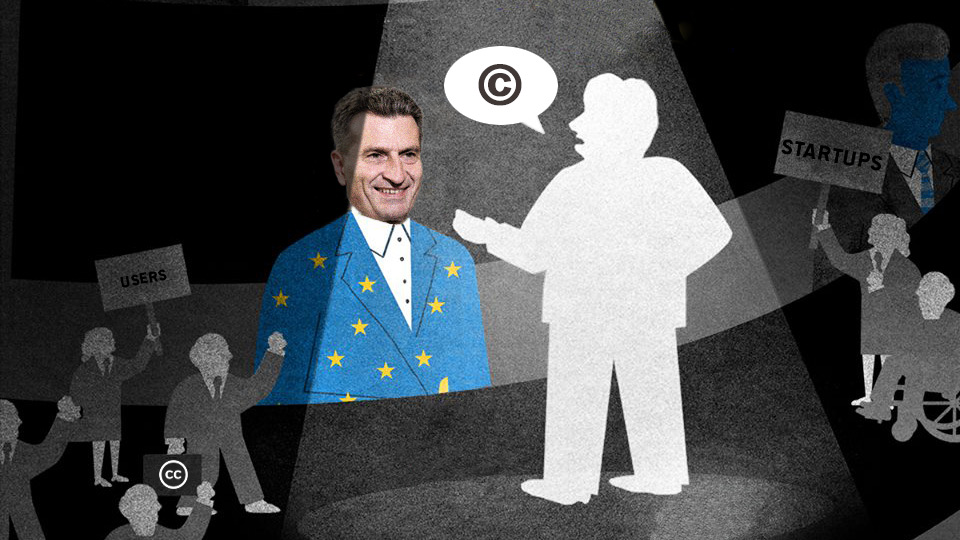In the evening of February 13, negotiators from the European Parliament and the Council concluded the trilogue negotiations with a final text for the new EU Copyright Directive.
For two years we’ve debated different drafts and versions of the controversial Articles 11 and 13. Now, there is no more ambiguity: This law will fundamentally change the internet as we know it – if it is adopted in the upcoming final vote. But we can still prevent that!
Read on for details about the text, how we got here and what to do now:
 Closed-door trilogue negotiations have concluded.
Closed-door trilogue negotiations have concluded.What’s in the EU Copyright Directive
Please click the links to take a look at the final wording of Article 11, Article 13, and for the whole text. Here’s my summary:
 Article 13: Upload filters
Article 13: Upload filters
Parliament negotiator Axel Voss accepted the deal between France and Germany I laid out in a recent blog post:
- Commercial sites and apps where users can post material must make “best efforts” to preemptively buy licences for anything that users may possibly upload – that is: all copyrighted content in the world. An impossible feat.
- In addition, all but very few sites (those both tiny and very new) will need to do everything in their power to prevent anything from ever going online that may be an unauthorised copy of a work that a rightsholder has registered with the platform. They will have no choice but to deploy upload filters, which are by their nature both expensive and error-prone.
- Should a court ever find their licensing or filtering efforts not fierce enough, sites are directly liable for infringements as if they had committed them themselves. This massive threat will lead platforms to over-comply with these rules to stay on the safe side, further worsening the impact on our freedom of speech.
![]()
Article 11: The “link tax”
The final version of this extra copyright for news sites closely resembles the version that already failed in Germany – only this time not limited to search engines and news aggregators, meaning it will do damage to a lot more websites.
- Reproducing more than “single words or very short extracts” of news stories will require a licence. That will likely cover many of the snippets commonly shown alongside links today in order to give you an idea of what they lead to. We will have to wait and see how courts interpret what “very short” means in practice – until then, hyperlinking (with snippets) will be mired in legal uncertainty.
- No exceptions are made even for services run by individuals, small companies or non-profits, which probably includes any monetised blogs or websites.
Other provisions
The project to allow Europeans to conduct Text and Data Mining, crucial for modern research and the development of artificial intelligence, has been obstructed with too many caveats and requirements. Rightholders can opt out of having their works datamined by anyone except research organisations.
Authors’ rights: The Parliament’s proposal that authors should have a right to proportionate remuneration has been severely watered down: Total buy-out contracts will continue to be the norm.
Minor improvements for access to cultural heritage: Libraries will be able to publish out-of-commerce works online and museums will no longer be able to claim copyright on photographs of centuries-old paintings.
* * *
How we got here
 Former digital Commissioner Oettinger proposed the law
Former digital Commissioner Oettinger proposed the lawThe history of this law is a shameful one. From the very beginning, the purpose of Articles 11 and 13 was never to solve clearly-defined issues in copyright law with well-assessed measures, but to serve powerful special interests, with hardly any concern for the collateral damage caused.
In the relentless pursuit of this goal, concerns by independent academics, fundamental rights defenders, independent publishers, startups and many others were ignored. At times, confusion was spread about crystal-clear contrary evidence. Parliament negotiator Axel Voss defamed the unprecedented protest of millions of internet users as “built on lies”.
In his conservative EPP group, the driving force behind this law, dissenters were marginalised. The work of their initially-appointed representative was thrown out after the conclusions she reached were too sensible. Mr Voss then voted so blindly in favour of any and all restrictive measures that he was caught by surprise by some of the nonsense he had gotten approved. His party, the German CDU/CSU, nonchalantly violated the coalition agreement they had signed (which rejected upload filters), paying no mind to their own minister for digital issues.
It took efforts equally herculean and sisyphean across party lines to prevent the text from turning out even worse than it now is.
In the end, a closed-door horse trade between France and Germany was enough to outweigh the objections… so far.
What’s important to note, though: It’s not “the EU” in general that is to blame – but those who put special interests above fundamental rights who currently hold considerable power. You can change that at the polls! The anti-EU far right is trying to seize this opportunity to promote their narrow-minded nationalist agenda – when in fact without the persistent support of the far-right ENF Group (dominated by the Rassemblement/Front National) the law could have been stopped in the crucial Legal Affairs Committee and in general would not be as extreme as it is today.
* * *
We can still stop this law
Our best chance to stop the EU copyright law: The upcoming Parliament vote.
Tweet this!
The Parliament and Council negotiators who agreed on the final text now return to their institutions seeking approval of the result. If it passes both votes unchanged, it becomes EU law, which member states are forced to implement into national law.
In both bodies, there is resistance.
The Parliament’s process starts with the approval by the Legal Affairs Committee – which is likely to be given on Monday, February 18.
Next, at a date to be announced, the EU member state governments will vote in the Council. The law can be stopped here either by 13 member state governments or by any number of governments who together represent 35% of the EU population (calculator). Last time, 8 countries representing 27% of the population were opposed. Either a large country like Germany or several small ones would need to change their minds: This is the less likely way to stop it.
Our best bet: The final vote in the plenary of the European Parliament, when all 751 MEPs, directly elected to represent the people, have a vote. This will take place either between March 25 and 28, on April 4 or between April 15 and 18. We’ve already demonstrated last July that a majority against a bad copyright proposal is achievable.
The plenary can vote to kill the bill – or to make changes, like removing Articles 11 and 13. In the latter case, it’s up to the Council to decide whether to accept these changes (the Directive then becomes law without these articles) or to shelve the project until after the EU elections in May, which will reshuffle all the cards.
This is where you come in
The final Parliament vote will happen mere weeks before the EU elections. Most MEPs – and certainly all parties – are going to be seeking reelection. Articles 11 and 13 will be defeated if enough voters make these issues relevant to the campaigns. (Here’s how to vote in the EU elections – change the language to one of your country’s official ones for specific information)
It is up to you to make clear to your representatives: Their vote on whether to break the internet with Articles 11 and 13 will make or break your vote in the EU elections. Be insistent – but please always stay polite.
- Look up your representatives’ voting behavior at SaveYourInternet.eu
- Call or visit your MEPs’ offices (in Brussels, Strasbourg or their local constituency)
- Visit campaign and party events and bring up the topic
- Sign the record-breaking petition and spread the word, if you haven’t yet
Together, we can still stop this law.
To the extent possible under law, the creator has waived all copyright and related or neighboring rights to this work.
I am confident that we can make our voices heard, that the proposed deal, no matter if in a weakened or otherwise changed form, is unacceptable and unhelpful in every possible way. Moreover, this event should mark a change in perception for our generation. Politics are not an old hat that nobody has to care about, it is a constant and necessary struggle, that allows us all to create a better present and future.
Hallo Julia
Mein Name ist Leon Blyum und ich wollte fragen was wir noch gorß tun konnen ich bin noch minderjährig aber setze mich für alles ein um das Internet zu schützen.
Was kann ich tun?
Liebe grüße,
Leon Blyum
Hallo Leon, es wird vorraussichtlich am 23.3. Demos im mehreren deutschen Städten geben, da könntest du z.B. hingehen, wenn du ein Zeichen setzen willst. Das wird gerade noch organisiert, mehr Infos bald auf http://savetheinternet.info
I stand with you.
will non profit sites still be unaffected?
They are exempt from Article 13 (upload filters) but may fall under Article 11 (“link tax”).
Does that mean that Article 13 would make not-for-profit filesharing programs legal by explicitly declaring them as not being online content sharing service providers?
They are not OCSSPs and therefore don’t fall under Article 13 of this Directive, but that doesn’t mean that good old copyright has stopped applying to them :)
Will we know the certain date for the final vote in the plenary?
With the EU elections coming, it’s really up to us citizens to campaign for this to be repealed!
Great post.
Yes, we will know the exact date at some point. It’s most likely to be April. Julia will surely inform about it on this website and on her Twitter at https://twitter.com/senficon
Hallo Julia,
vielen Dank für Deine Mühe!
Ich habe nun Mails an alle Abgeordnete von SPD und Grüne geschrieben, die rot bzw. weiss hinterlegt waren.
Mails an die abgeordnete die eh schon dagegen gestimmt haben sollten doch nicht so wichtig sein oder?
Gruß
Rüdiger
I’m with you!
Stop this crazy Thing
Is there any clarity on how Brexit would influence the plenary vote? Presumably it’ll depend on whether it happens on March 25 or in April? Does it matter for the currently expected percentages you quoted?
British MEPs were split just about down the middle on the issue during the last vote, so it is unlikely to have a big impact.
Thanks for these updates! I couldn’t find the full voted text, could you please provide it? Thanks in advance!
It’s now available here: https://juliareda.eu/wp-content/uploads/2019/02/Copyright_Final_compromise.pdf
I’m positive we can have our voices heard. I’m hoping for what happened in July, with the majority voting against. We did it before, so why not now?
Is there a way I could email MEPs about this?
Hi, there’s a form to email your MEPs here: https://saveyourinternet.eu/act/
I´ve been following your page for months. This is big and crazy, huge and madness.
Why don´t MEP´s or anybody with relevance talk about this?
I haven´t even seen it in the news.
Is it because to know what this law does, implies some Copyright or computer science knowledge?
I mean… This is the closest thing to control our lives.
Don´t people pay servers? Don´t we already have to struggle with the youtube licenses?.
Life must not be monetized.
Julia, can an individual person demand the EU parlament?
Or do you have any ideas to make a public or grupal demand?
Sorry, my English is bad and my country is idiotic with this kind of laws,having corrupted people that stole millions of euros free, and Nintendo DS R4 sellers in prison.
Well this how ends up voting for old boys with liberal/leftist thinking. Make sure You won’t make the mistake on next UE elections, vote for young and clear thinking people.
Don’t vote for PAST!
Both the Commissioner and the Parliament rapporteur responsible for this law come from center-right Christian conservative parties, not particularly liberal and certainly not leftist.
If the directive were to be eventually passed into law, do we have a silver lining? I hope it will be the European Court of Justice who will save us…
Will this in anyway affect decentralized social networks as Diaspora or Mastodon? It seems this copyright directive only applies to commercial enterprises.
I can’t fully agree with one exception: the one about data-mining. No problem this has to be possible for scientific research by public universities, but I do not agree I should “opt-out” when I don’t want my data to be mined by entrepreneurs, by corporate businesses. It should be needed to “opt-in” for that and not “opt-out”.
And what about American websites? Are they going to block every visitor coming from a European IP ? Some American press websites already started this blocking practice due to the GDPR, and a few larger ones link visitors trough to a so called “European Experience”.
Yes, the EU makes it truly a “Single Market”: the worldwide web becomes a Europe-wide web for all EU-citizens.
VPN will become very popular in the EU, just as it is in dictatorial countries, it becomes necessary in this “technocratic corporate business regime” to bridge Tor behind a VPN to enjoy a free Internet.
Articles 11 and 13 are an absolutely disgusting misuse of political systems that serve absolutely no one except corporate profit margins – corporations that are raking in historic amounts of profit already!
If these make it through, then someone needs to start a serious crusade against the political corruption that is corporate lobbying.
Willkommen Julia
Ob Artikel 11 trifft zu auch Presse, Bücher Papier? Autoren WAS PUBLIKATIONEN AUF DEM PAPIER VERÖFFENTLICHT WERDEN, MÜSSEN SIE IN EINER SONDERLIZENZ BESTEHEN, WENN SIE FÜR EINEN INHALT EINES ANDEREN AUTORS BEGEBEN. ODER IN DIESEN FÄLLEN GILT ES NUR AUF RECHT AUF ANGEBOT?
Entschuldigung für meine Deutsch.
Nein, Artikel 11 betrifft nur das Internet.
Work done. I’ve emailem my MEP with explanation why they shouldn’t vote for these articles. Also, I thanked to all that are against.
Let’s make our voices heard. Emailing/phoning the MEPs and explaining is the best way, and linking to actual articles such as these helps in our goal to get rid of this Internet freedom terminator…
Julia,
I’m confused about Article 11. Every story about it (and your explanation above) refers to “news stories” and this being widely discussed with reference to services such as Google News. As you know, Google are suggesting that they may shut down that service in the EU.
But what about Google’s main search engine? That will contain links to news stories as well, as part of general searches. Will that fall under Article 11 as well and, if so, why is everyone reporting this business as though it will only affect news aggregators?
Sorry for the late reply. You are correct: Article 11 will affect web search engines just as much. The German law did not, so maybe that’s why people are focusing on news aggregators.
Thanks for defending our rights all this time, and offering reasonable improvements and alternatives.
And I appreciate you pointing out the errors with the new ‘false facts’ Promo Video that tries to promote this law on taxpayers account. https://twitter.com/Senficon/status/1101075820012077056
Can the PP start a campain to have it reported to EUvsDisinfo? Perhaps if the EU Parlement gets censored by it’s own institutions, it will be forced to adres the problems with either or both.
https://euvsdisinfo.eu/contact-us/
Julia, has article 12(a) in respect of Protection of sport event organizers rights been removed/deleted? Is there any background as to why?
Sorry for the late reply! It was deleted in the trilogue negotiations.
good job
I want to take part in the mass demonstrations on the 23rd against articles 11 and 13 of the new EU copyright directive. I am a foreigner married to a German, with provisional permission to live with my spouse in Germany for three years, but I am not supposed to take part in “political activity” during that time. My wife is worried that the immigration authority might decide not to renew my residence permit if they find out I attended a protest. Is that something we need to be concerned about? If not, you might want to state this where other foreigners married to Europeans can see it.